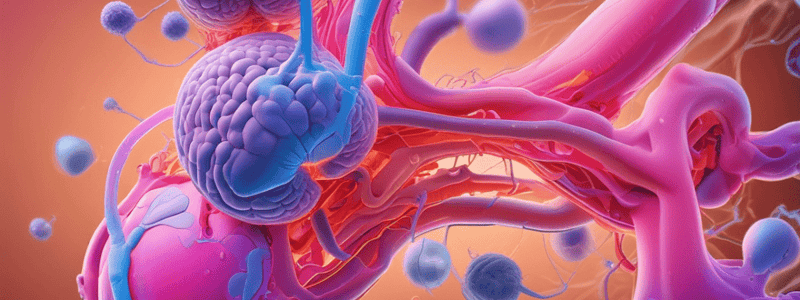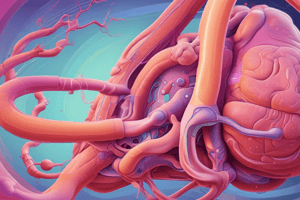Podcast
Questions and Answers
What is the functional unit of the kidney responsible for regulating fluid balance and excretion of waste products?
What is the functional unit of the kidney responsible for regulating fluid balance and excretion of waste products?
- Loop of Henle
- Renal corpuscle
- Nephron (correct)
- Bowman's capsule
Which part of the nephron filters blood as a capillary network, while tubules help reabsorb essential molecules and excrete waste products?
Which part of the nephron filters blood as a capillary network, while tubules help reabsorb essential molecules and excrete waste products?
- Proximal convoluted tubule
- Renal corpuscle (correct)
- Distal convoluted tubule
- Loop of Henle
What process involves the removal of small waste molecules and excess fluids from the bloodstream in the kidneys?
What process involves the removal of small waste molecules and excess fluids from the bloodstream in the kidneys?
- Renal regulation
- Tubular reabsorption
- Tubular secretion
- Glomerular filtration (correct)
Which of the following factors can influence glomerular filtration rate (GFR)?
Which of the following factors can influence glomerular filtration rate (GFR)?
What is primarily responsible for reabsorbing essential molecules back into the body during kidney function?
What is primarily responsible for reabsorbing essential molecules back into the body during kidney function?
Which part of the kidney undergoes structural changes leading to a gradual decline in glomerular filtration rate with aging?
Which part of the kidney undergoes structural changes leading to a gradual decline in glomerular filtration rate with aging?
Which of the following is NOT a primary mechanism driving tubular reabsorption?
Which of the following is NOT a primary mechanism driving tubular reabsorption?
Which hormone plays a crucial role in regulating blood volume and blood pressure through vasoconstriction and salt retention?
Which hormone plays a crucial role in regulating blood volume and blood pressure through vasoconstriction and salt retention?
Which segment of the nephron is primarily responsible for selective reabsorption of essential nutrients and electrolytes?
Which segment of the nephron is primarily responsible for selective reabsorption of essential nutrients and electrolytes?
Which of the following medications can reduce glomerular filtration rate (GFR) by affecting blood flow and vessel tone?
Which of the following medications can reduce glomerular filtration rate (GFR) by affecting blood flow and vessel tone?
Which of the following hormones stimulates diuresis by increasing blood flow and glomerular filtration?
Which of the following hormones stimulates diuresis by increasing blood flow and glomerular filtration?
Which dietary factor can potentially lead to acidosis and chronic kidney disease if consumed in excess?
Which dietary factor can potentially lead to acidosis and chronic kidney disease if consumed in excess?
Which type of neurogenic bladder is characterized by an overactive detrusor muscle and a coordinated external urethral sphincter?
Which type of neurogenic bladder is characterized by an overactive detrusor muscle and a coordinated external urethral sphincter?
What is the primary cause of neurogenic bladder dysfunction according to the passage?
What is the primary cause of neurogenic bladder dysfunction according to the passage?
Which of the following is NOT a common type of neurogenic bladder dysfunction mentioned in the passage?
Which of the following is NOT a common type of neurogenic bladder dysfunction mentioned in the passage?
What symptom is associated with detrusor hyperreflexia, the type of neurogenic bladder dysfunction described in the passage?
What symptom is associated with detrusor hyperreflexia, the type of neurogenic bladder dysfunction described in the passage?
Which of the following investigations would be most useful in diagnosing the type of neurogenic bladder dysfunction described in the passage?
Which of the following investigations would be most useful in diagnosing the type of neurogenic bladder dysfunction described in the passage?
What type of urinary incontinence is the patient in the clinical case experiencing, and why?
What type of urinary incontinence is the patient in the clinical case experiencing, and why?
Which nerve is primarily responsible for the involuntary contraction of the detrusor muscle during the voiding phase of urination?
Which nerve is primarily responsible for the involuntary contraction of the detrusor muscle during the voiding phase of urination?
Which nerve is primarily responsible for the relaxation of the internal urethral sphincter during the voiding phase of urination?
Which nerve is primarily responsible for the relaxation of the internal urethral sphincter during the voiding phase of urination?
What is the main function of the hypogastric plexus in the control of urination?
What is the main function of the hypogastric plexus in the control of urination?
Which type of urinary incontinence is characterized by a sudden, strong urge to urinate that is difficult to suppress, often leading to involuntary urine leakage?
Which type of urinary incontinence is characterized by a sudden, strong urge to urinate that is difficult to suppress, often leading to involuntary urine leakage?
What is the primary function of the pudendal nerve in the control of urination?
What is the primary function of the pudendal nerve in the control of urination?
What is the main mechanism that allows the bladder to relax and fill during the filling phase of the urination cycle?
What is the main mechanism that allows the bladder to relax and fill during the filling phase of the urination cycle?
Which of the following is a key feature of detrusor areflexia, a type of neurogenic bladder dysfunction?
Which of the following is a key feature of detrusor areflexia, a type of neurogenic bladder dysfunction?
Which of the following is a common cause of overflow urinary incontinence?
Which of the following is a common cause of overflow urinary incontinence?
What is the primary function of the pelvic splanchnic nerves in the control of urination?
What is the primary function of the pelvic splanchnic nerves in the control of urination?
What is the most likely diagnosis for the 32-year-old male patient presenting with sudden onset flank pain, nausea/vomiting, and colicky pain radiating to the groin?
What is the most likely diagnosis for the 32-year-old male patient presenting with sudden onset flank pain, nausea/vomiting, and colicky pain radiating to the groin?
Which type of urinary incontinence is characterized by an involuntary leakage of urine due to a sudden increase in intra-abdominal pressure, such as during coughing or sneezing?
Which type of urinary incontinence is characterized by an involuntary leakage of urine due to a sudden increase in intra-abdominal pressure, such as during coughing or sneezing?
Which type of urinary incontinence is associated with an overactive bladder and a sudden, strong urge to urinate that is difficult to control?
Which type of urinary incontinence is associated with an overactive bladder and a sudden, strong urge to urinate that is difficult to control?
Which condition is characterized by the inability to empty the bladder completely, leading to urinary retention and overflow incontinence?
Which condition is characterized by the inability to empty the bladder completely, leading to urinary retention and overflow incontinence?
Which condition is characterized by a disruption in the normal neural pathways controlling bladder function, leading to various types of urinary incontinence or retention?
Which condition is characterized by a disruption in the normal neural pathways controlling bladder function, leading to various types of urinary incontinence or retention?
Flashcards are hidden until you start studying
Study Notes
Renal Physiology refers to the functions of the kidney and its impact on overall body health. It involves understanding how the kidneys filter blood and maintain water balance through various processes like nephron function, glomerular filtration, tubular reabsorption, and renal regulation.
Nephron Function
A nephron is the functional unit of the kidney responsible for regulating fluid balance and excretion of waste products from the body. Each kidney contains approximately one million nephrons, which work together to perform these critical tasks.
Structure of a Nephron
Each nephron consists of three main segments: the glomerulus, proximal convoluted tubule, and distal convoluted tubule. The glomerulus, a capillary network, filters blood, while the tubules help reabsorb essential molecules back into the body while excreting waste products.
Glomerular Filtration
Glomerular filtration is the process by which the kidneys remove small waste molecules and excess fluids from the bloodstream. This occurs when blood enters the glomerulus, where the high hydrostatic pressure forces fluids and small solutes through the glomerular membrane and into Bowman's capsule.
Factors Affecting Glomerular Filtration
Several factors can influence glomerular filtration rate (GFR), including age, medications, hydration status, and pathological conditions. For example, aging causes a gradual decline in GFR due to structural changes in the glomerulus. Some medications, such as nonsteroidal anti-inflammatory drugs (NSAIDs) and angiotensin converting enzyme inhibitors (ACEI), can also reduce GFR by affecting blood flow and vessel tone.
Tubular Reabsorption
Tubular reabsorption is the process by which the kidneys selectively reabsorb essential nutrients and electrolytes while excreting waste products. This occurs mainly in the proximal and distal convoluted tubules.
Mechanisms of Tubular Reabsorption
Two primary mechanisms drive tubular reabsorption: active transport and passive diffusion. Active transport involves specialized proteins called carrier proteins, which move molecules against their concentration gradient using energy derived from ATP. Passive diffusion simply allows molecules to diffuse across cell membranes based on their concentration gradient.
Renal Regulation
Renal regulation ensures proper maintenance of fluid balance and blood pH levels. It can be influenced by several factors, including hormones and diet.
Hormonal Influence on Renal Regulation
The renin-angiotensin system plays a crucial role in regulating blood volume and blood pressure by controlling vasoconstriction and salt retention. Additionally, aldosterone helps control potassium levels by promoting sodium retention. Atrial natriuretic peptide (ANP) and erythropoietin stimulate diuresis by increasing blood flow and glomerular filtration.
Dietary Factors Affecting Renal Regulation
Diet can significantly impact renal regulation, with excessive consumption of salt and protein potentially leading to acidosis and chronic kidney disease. Conversely, maintaining balanced nutrition, especially with adequate vitamin D intake, promotes healthy kidney function.
In conclusion, renal physiology involves complex interactions between various structures and processes within the kidney, ensuring efficient removal of waste products and maintenance of fluid homeostasis. Understanding these aspects is key to diagnosing and treating disorders related to kidney function.
Studying That Suits You
Use AI to generate personalized quizzes and flashcards to suit your learning preferences.




